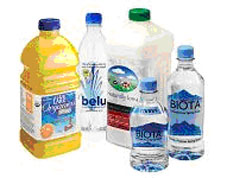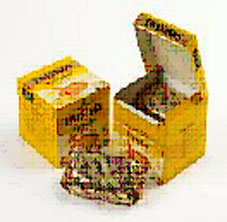The path to going green can be much shorter when suppliers and end-users team up creatively
IT was just over two years ago that NatureWorks pledged to responsibly and transparently introduce its natural plastic resin bottles for water, dairy, juice, and other beverages into the market. Since then, significant strides have been made both by the packaging and recycling industry toward the adoption of bottles made from renewable resources rather than imported oil. "Our twin goals were to work with brand owners on carefully phased bottle introductions and on a parallel track to develop a deeper environmental and technical understanding of end-of-life scenarios for bottles made from renewable resources rather than oil. Both of these efforts saw significant advances throughout 2007 and 2008," said Marc Verbruggen, NatureWorks president and CEO.  Key milestones during this 24-month period included a grant from the state of California for a bioresin recycling pilot project, the first national rollout of water bottles made from NatureWorks?Ingeo natural plastic, and a lifecycle analysis that determined the unequivocal environmental and performance benefits that will result when recycling NatureWorks?Ingeo-based bottles back into bottles. Ingeo is highly engineered bioresin made from polylactic acid (PLA). For films specialist, Innovia, developments in the sustainable arena have been equally satisfying. Although the UK firm's biodegradable and compostable business is a relatively small part of its operations, recent years have seen a major increase in interest in biodegradable and renewable packaging materials. Applications for its cellulose-based NatureFlex films now range from dried goods such as energy bars and tea, to baked goods and snacks. Bottle introductions in 2008 Following a two-million bottle, five-month long pilot project, Primo Water Corporation (www.primowater.com) of Winston Salem, North Carolina, introduced its new line of bottled water in Ingeo single-serve bottles. Primo Water is the first product bottled with renewable plastic to be sold across the United State. Last August, Primo was instrumental in forming the Bioplastics Recycling Consortium, an organization pledged to develop a recovery system and end markets for post-consumer bioplastic materials. Earlier in 2008, Good Water (www.goodwater.org.nz) of New Zealand completed a successful pilot study of collecting and recycling Ingeo-based bottles and introduced its new bottled water line. The Kiwi bottler also contributed to the establishment of Greenplastics Inc. (www.greenplastics.org.nz), a stewardship organization dedicated to developing, promoting, and securing options for post-consumer uses of bioresins. "The Primo and Good Water examples illustrate how NatureWorks is working responsibly to introduce bottles made from Ingeo," Verbruggen said. "NatureWorks looks for brand owners that share its commitment to decrease dependence on non-renewable resources, lower the environmental impact of packaging, work transparently with stakeholders, and plan for end-of-life recovery and reuse."
Key milestones during this 24-month period included a grant from the state of California for a bioresin recycling pilot project, the first national rollout of water bottles made from NatureWorks?Ingeo natural plastic, and a lifecycle analysis that determined the unequivocal environmental and performance benefits that will result when recycling NatureWorks?Ingeo-based bottles back into bottles. Ingeo is highly engineered bioresin made from polylactic acid (PLA). For films specialist, Innovia, developments in the sustainable arena have been equally satisfying. Although the UK firm's biodegradable and compostable business is a relatively small part of its operations, recent years have seen a major increase in interest in biodegradable and renewable packaging materials. Applications for its cellulose-based NatureFlex films now range from dried goods such as energy bars and tea, to baked goods and snacks. Bottle introductions in 2008 Following a two-million bottle, five-month long pilot project, Primo Water Corporation (www.primowater.com) of Winston Salem, North Carolina, introduced its new line of bottled water in Ingeo single-serve bottles. Primo Water is the first product bottled with renewable plastic to be sold across the United State. Last August, Primo was instrumental in forming the Bioplastics Recycling Consortium, an organization pledged to develop a recovery system and end markets for post-consumer bioplastic materials. Earlier in 2008, Good Water (www.goodwater.org.nz) of New Zealand completed a successful pilot study of collecting and recycling Ingeo-based bottles and introduced its new bottled water line. The Kiwi bottler also contributed to the establishment of Greenplastics Inc. (www.greenplastics.org.nz), a stewardship organization dedicated to developing, promoting, and securing options for post-consumer uses of bioresins. "The Primo and Good Water examples illustrate how NatureWorks is working responsibly to introduce bottles made from Ingeo," Verbruggen said. "NatureWorks looks for brand owners that share its commitment to decrease dependence on non-renewable resources, lower the environmental impact of packaging, work transparently with stakeholders, and plan for end-of-life recovery and reuse."  In April, following several months of extensive tests, the Italian firm Fonti di Vinadio began bottling Sant扐nna (www.santanna.it) mineral water in Ingeo bioplastic packaging. In Italy, Sant扐nna is available at the majority of Ipercoop stores. With the assistance of qualified partners, the company continues to collect data on the new bottle's market impact and consumer acceptance. Cutting waste with compostable film Founded in 1706, Twinings (www.twinings.com) high quality teas are enjoyed today in more than 100 countries around the globe. While adhering to centuries-old tea tradition, the company is always looking at ways to lessen its impact on the environmNike
In April, following several months of extensive tests, the Italian firm Fonti di Vinadio began bottling Sant扐nna (www.santanna.it) mineral water in Ingeo bioplastic packaging. In Italy, Sant扐nna is available at the majority of Ipercoop stores. With the assistance of qualified partners, the company continues to collect data on the new bottle's market impact and consumer acceptance. Cutting waste with compostable film Founded in 1706, Twinings (www.twinings.com) high quality teas are enjoyed today in more than 100 countries around the globe. While adhering to centuries-old tea tradition, the company is always looking at ways to lessen its impact on the environmNike













